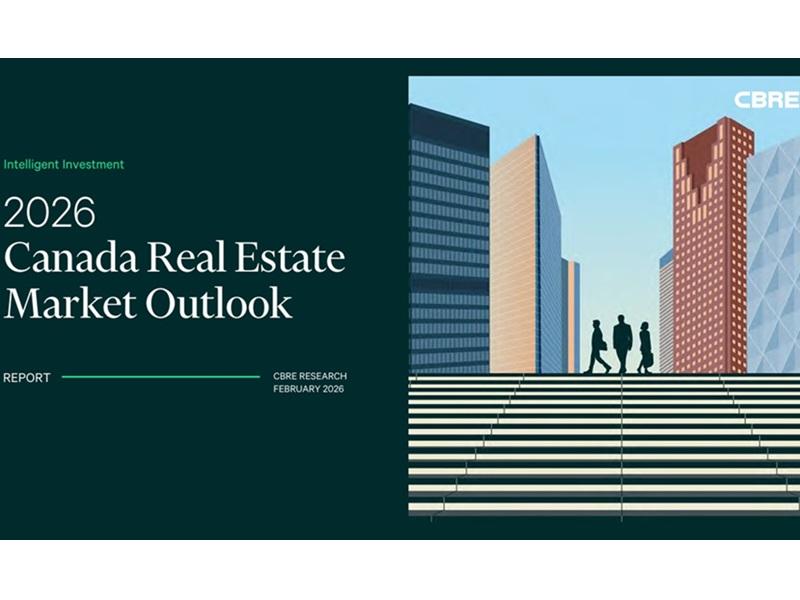
Benjamin Tal, the deputy chief economist at CIBC. (Courtesy CIBC)
Benjamin Tal and David Rosenberg returned to the Real Estate Forum stage in Toronto last week for their annual state-of-the-economy addresses and, for the second year in a row, offered differing interpretations of whether a recession is imminent.
While not predicting the sky would fall, Rosenberg was again more pessimistic than Tal. Rosenberg, chief economist and strategist for Gluskin Sheff and Associates in New York, predicted that “sometime in the first half of next year a recession will be starting us right in the face.”
Tal, the deputy chief economist at CIBC, made a case for the economy, and the commercial real estate industry, being closer to mid-cycle than late-cycle. He admitted however, “the market is trying to decide.”
“I am not a Pollyanna. I do believe that the cycle is not dead, and there will be a recession,” Tal told about 2,600 CRE professionals at the two-day conference. “The question is what about 2020? Will we be able to avoid a recession?”
Recession views differ
He said despite persistent fears of a looming recession for more than a year, the economy has soldiered on. Thanks to two key sectors, so has the CRE industry.
“Your business has nine lives. Every time it’s supposed to slow down because of high interest rates, something bad happens elsewhere that keeps interest rates low and the party still going,” he observed. “Especially in residential and industrial markets, you don’t need much to keep momentum flowing.”
Both men pointed to the bond and interest rate yield curve as evidence for their positions. Flat last year, Rosenberg said the curve has now inverted and historically, that means a recession is imminent about 80 per cent of the time.
He also pointed to the intensifying technology and trade battles between the U.S. and China, rising corporate and household debt, interest rate cuts and moves by the U.S. Fed to increase the money supply. On the latter factor, he pointed out the increased monetary supply has not led to corresponding growth in GDP, as is intended.

David Rosenberg, the chief economist at Gluskin Sheff and Associates. (Courtesy Gluskin Sheff)
“It’s boosting the money supply, but the money ain’t going into the real economy, it’s going into financial assets,” he said, calling recent corporate strategies the “greatest debt-for-equity swap in history.”
The extra liquidity did not result in the acquisition or creation of assets: “It went to buy back stock to the point that the share count on the S&P 500 is at its lowest point in 20 years.”
He also noted the St. Louis Fed’s recession risk rating jumped from 20 per cent two years ago to 50 per cent last year and about 75 per cent now. These and other factors led Rosenberg to urge caution.
“Even if you don’t agree with my opinion,” he said, “it (risk) is high enough that we should be prepared, because they are part of the landscape, part of the business cycle.”
Tal sees mid-cycle economy
Tal followed with a somewhat different take on the indicators, including the yield curve. Using a chart to illustrate the curve, he pointed to two highlighted time periods.
“Everybody is focusing on the recession, but I want to focus on those two little symbols. That’s 1995 and 1998,” he explained. “We had an inverted yield curve and nothing happened. Why?
“Nothing happened because the Fed cut interest rates in both cases the way it is doing now. We call it mid-cycle easing. So when you look at the situation and try to make sense of this madness, the question we are asking ourselves today is, to what extent we are in (a) mid-cycle-type situation, or are we in mid-cycle easing?
“My call at this point is that today’s environment, given the numbers we can see in the consumer confidence in the U.S., we are more consistent with a mid-cycle situation. That is my guess. And if that is the case, it is possible the market will actually surprise on the up-side just because of that.”
The wild card remains trade, and the possible fallout of the U.S. and China tensions. Tal agreed with Rosenberg what is happening is a technology war between an established global superpower and an emerging economic and technological juggernaut. He also called it the beginning of “deglobalization.”
One result has been China moving to repatriate money which used to be invested globally — including in Canada.
“You ask any developer in Montreal, in Vancouver, and they will tell you, Chinese money is not coming. You know it better than anyone else,” Tal said. “Everything is connected.”
Tal also said the Fed’s 75-basis-point rate cuts, and a “green light” for Donald Trump’s U.S. government to spend on economic stimulus, will both help the U.S. economy.
Canada’s situation different
But what about Canada?
He questioned the Bank of Canada’s decision not to follow the U.S. Fed and cut interest rates to lower the Canadian dollar and boost competitiveness in the U.S. market. It does remain our top trading partner, he pointed out, and Canada is losing market share.
“Don’t get too excited about the Loonie, because we need the Loonie low, not high,” Tal said, noting that having jobs is more important than being able to vacation cheaply in Florida. “That’s the motivation to cut if they are going to cut. But the question is, will they?”
Finally, he addressed one of the key engines driving the real estate industry these days, the multiresidential and housing sector. Population growth is driving demand, even in weaker markets such as Saskatchewan and Alberta. Government policy moves to cool off rapidly rising housing costs led to slowdowns in the GTA and Vancouver, but both markets have recovered or are well on their way back.
“There is no national housing market as we all know it,” Tal said, noting the regional variables. “But we do know that we are in an inventory situation that is consistent with a strong housing market.
“We are basically where we should be. So to me, this is a market in equilibrium.”
Looking out over the room as he concluded, Tal offered a bit of comfort.
“I believe we are in a mid-cycle easing that might prevent a recession, or at least postpone it. The cycle is not dead, there will be a recession, but maybe not next year. And in this type of situation, if interest rates remain relatively low and we are simply avoiding the recession, you will be relatively okay in 2020.”
RELATED ARTICLES:







